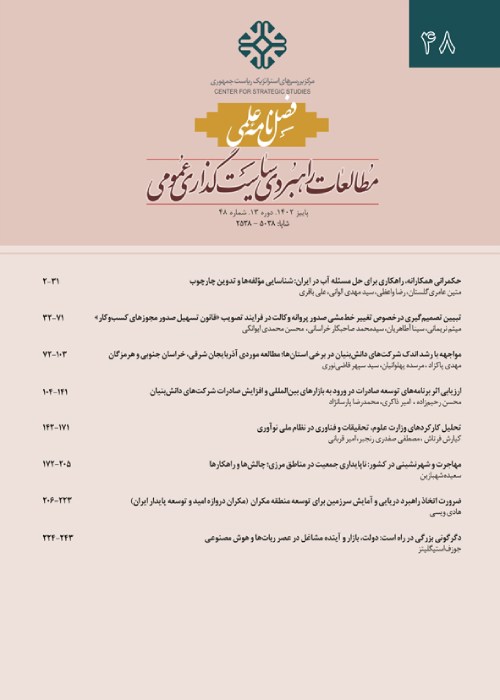Reanalyzing Global Components of Islamic-Iranian Identity in Rumi's Masnavi
Author(s):
Abstract:
Development of new communicative technology and the widespread use of this technology in the world has led all communities even the poorest and most remote countries to enjoy facilities to communicate around the world much more and advanced than before. Regardless its beneficiary or suffering، the impact on people’s lives around the world has been so invasive that will need to rapidly investigate. “Language & Literature «is one of the key issues in studies of globalization، especially in terms of purely literary and artistic work which has always inherently global capabilities and contacts of world’s finding. Persian language and literature is no exception to this rule، especially proud of the point that history is ancient، and its intellectual and literary agents have a privileged position in the world. Persian works of literature have many components of the world''s masterpieces both of form and meaning.» Masnavi «، an example of the result of the Iranian nation is intuitive genius and recognition due to the pure and sublime human experiences and teachings. It is a heart-touching and attractive text in proportion to the unconscious and conscious mind. This research seeks to study and identify various dimensions of globalization and its relation to cultural، social and political realms with the emphasis on cultural dimension. Accordingly، the present research seeks to answer the key question of what the national identity criteria -emphasizing the characteristics of Islamic Iranian- are and how they could contribute to globalization by existing intellectual structures and technical capacities.
Keywords:
Language:
Persian
Published:
Journal Strategic Studies of Public Policy, Volume:4 Issue: 12, 2013
Pages:
145 to 177
magiran.com/p1214045
دانلود و مطالعه متن این مقاله با یکی از روشهای زیر امکان پذیر است:
اشتراک شخصی
با عضویت و پرداخت آنلاین حق اشتراک یکساله به مبلغ 1,390,000ريال میتوانید 70 عنوان مطلب دانلود کنید!
اشتراک سازمانی
به کتابخانه دانشگاه یا محل کار خود پیشنهاد کنید تا اشتراک سازمانی این پایگاه را برای دسترسی نامحدود همه کاربران به متن مطالب تهیه نمایند!
توجه!
- حق عضویت دریافتی صرف حمایت از نشریات عضو و نگهداری، تکمیل و توسعه مگیران میشود.
- پرداخت حق اشتراک و دانلود مقالات اجازه بازنشر آن در سایر رسانههای چاپی و دیجیتال را به کاربر نمیدهد.
In order to view content subscription is required
Personal subscription
Subscribe magiran.com for 70 € euros via PayPal and download 70 articles during a year.
Organization subscription
Please contact us to subscribe your university or library for unlimited access!



